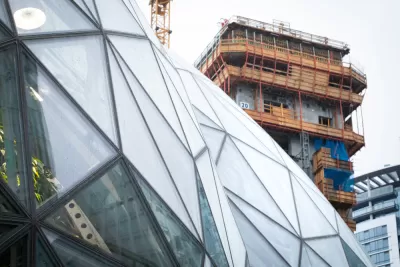The Seattle City Council, prompted by pressure from Mayor Jenny Durkan, approved a smaller version of the "Head Tax" that provoked the ire of Amazon.

"On Monday, the Seattle City Council unanimously passed an amended version of the Employee Hours 'Head' Tax built on a compromise with Mayor Jenny Durkan that lowered the cost per full time employee from $500 to $275," reports Doug Trumm.
With $28.7 million per year on average for affordable housing creation, Council Staff project the head tax will create 591 new homes for people below 30% of area median income. That works out to approximately $242,600 per unit. An additional $12.5 million over the last three years of the head tax will support the operation another 302 existing deeply-affordable homes. In essence, the head tax is like having another housing levy, but not funded through property taxes.
The new tax created controversy earlier in May, when Amazon ceased planning the Block 18 project to signal its displeasure with the proposition. After the amended version of the new tax passed through City Council, Amazon announced it would resume planning for Block 18, but has remained undecided about the fate of the Rainier Skyscraper project already under construction (the company might decide to sublease some or all of the space rather than fill it with Amazon employees).
Matt Day reports in detail on Amazon's reaction to the news of the Head Tax passing through the City Council, including publication of this statement by Amazon spokesperson Drew Herdener: "While we have resumed construction planning for Block 18, we remain very apprehensive about the future created by the council’s hostile approach and rhetoric toward larger businesses, which forces us to question our growth here."
FULL STORY: Seattle Council Passes Smaller $275 Head Tax After Mayor Durkan Threatens Veto

Planetizen Federal Action Tracker
A weekly monitor of how Trump’s orders and actions are impacting planners and planning in America.

Chicago’s Ghost Rails
Just beneath the surface of the modern city lie the remnants of its expansive early 20th-century streetcar system.

San Antonio and Austin are Fusing Into one Massive Megaregion
The region spanning the two central Texas cities is growing fast, posing challenges for local infrastructure and water supplies.

Since Zion's Shuttles Went Electric “The Smog is Gone”
Visitors to Zion National Park can enjoy the canyon via the nation’s first fully electric park shuttle system.

Trump Distributing DOT Safety Funds at 1/10 Rate of Biden
Funds for Safe Streets and other transportation safety and equity programs are being held up by administrative reviews and conflicts with the Trump administration’s priorities.

German Cities Subsidize Taxis for Women Amid Wave of Violence
Free or low-cost taxi rides can help women navigate cities more safely, but critics say the programs don't address the root causes of violence against women.
Urban Design for Planners 1: Software Tools
This six-course series explores essential urban design concepts using open source software and equips planners with the tools they need to participate fully in the urban design process.
Planning for Universal Design
Learn the tools for implementing Universal Design in planning regulations.
planning NEXT
Appalachian Highlands Housing Partners
Mpact (founded as Rail~Volution)
City of Camden Redevelopment Agency
City of Astoria
City of Portland
City of Laramie





























